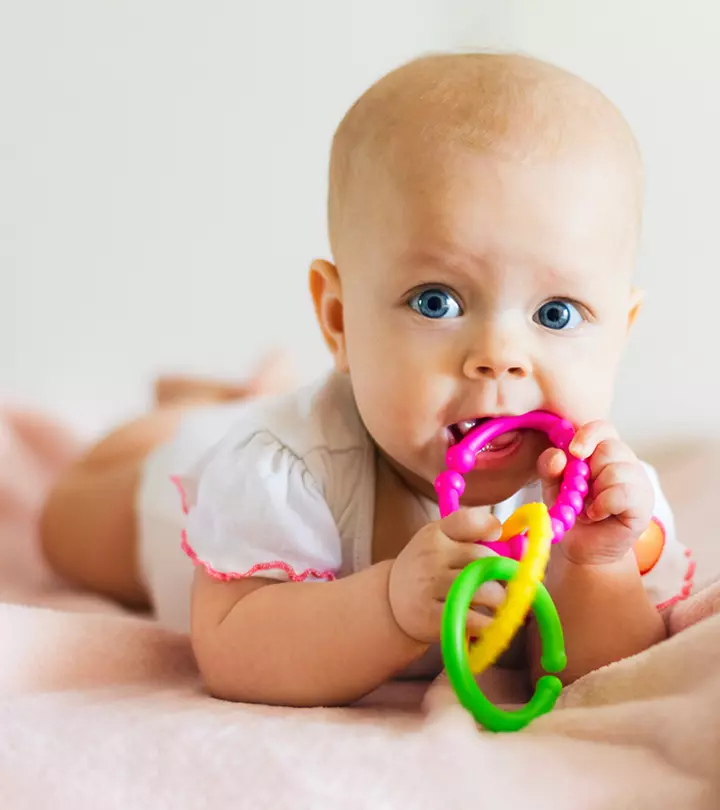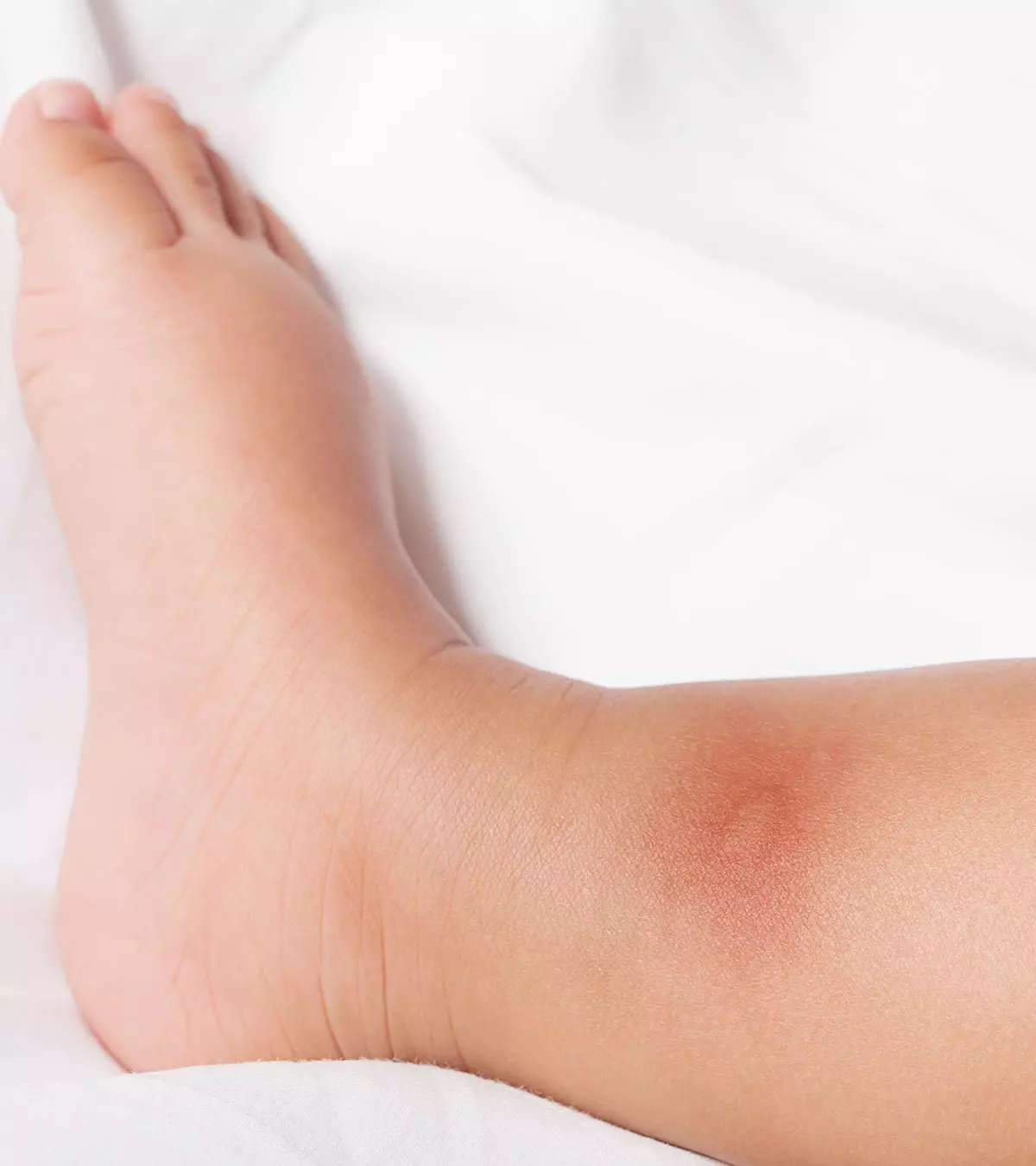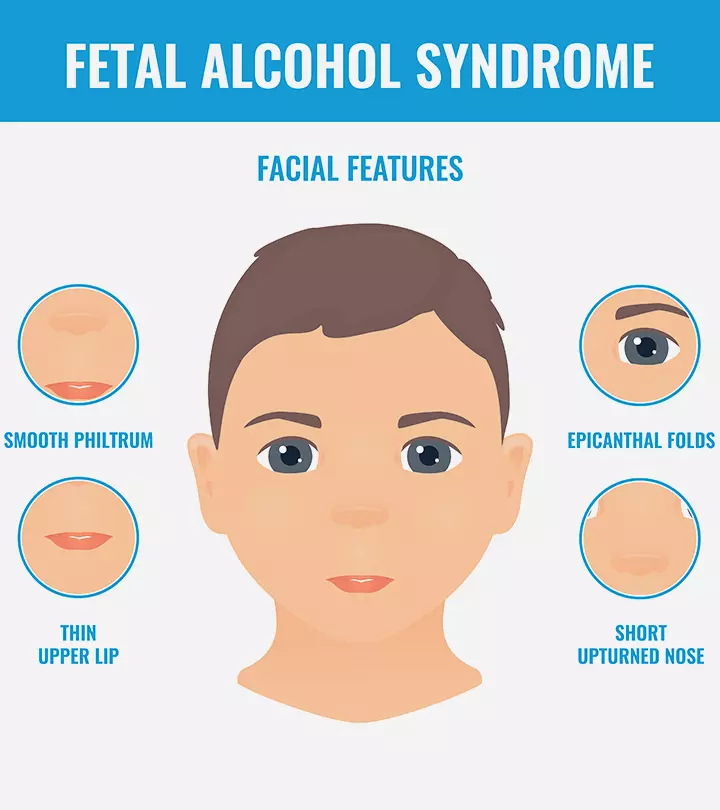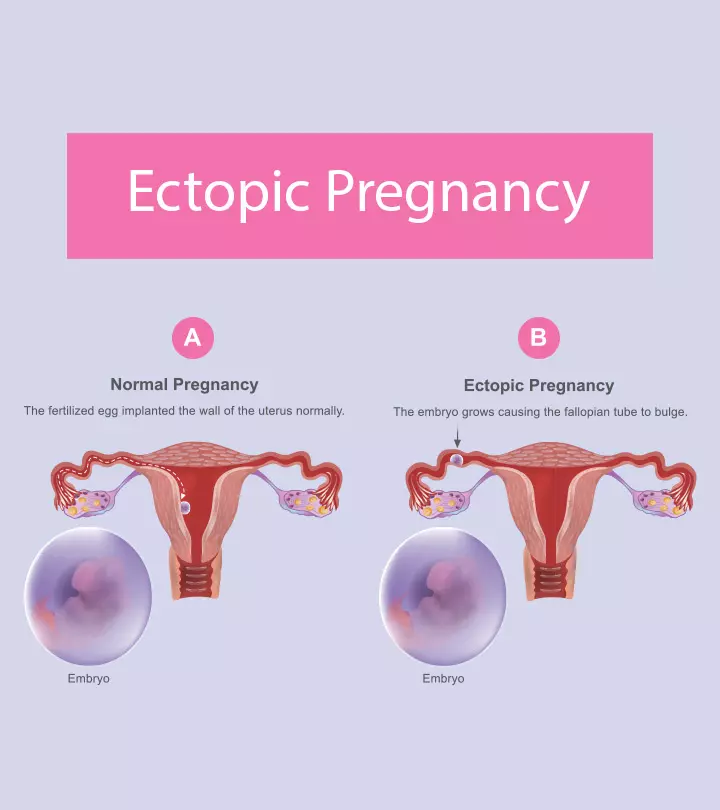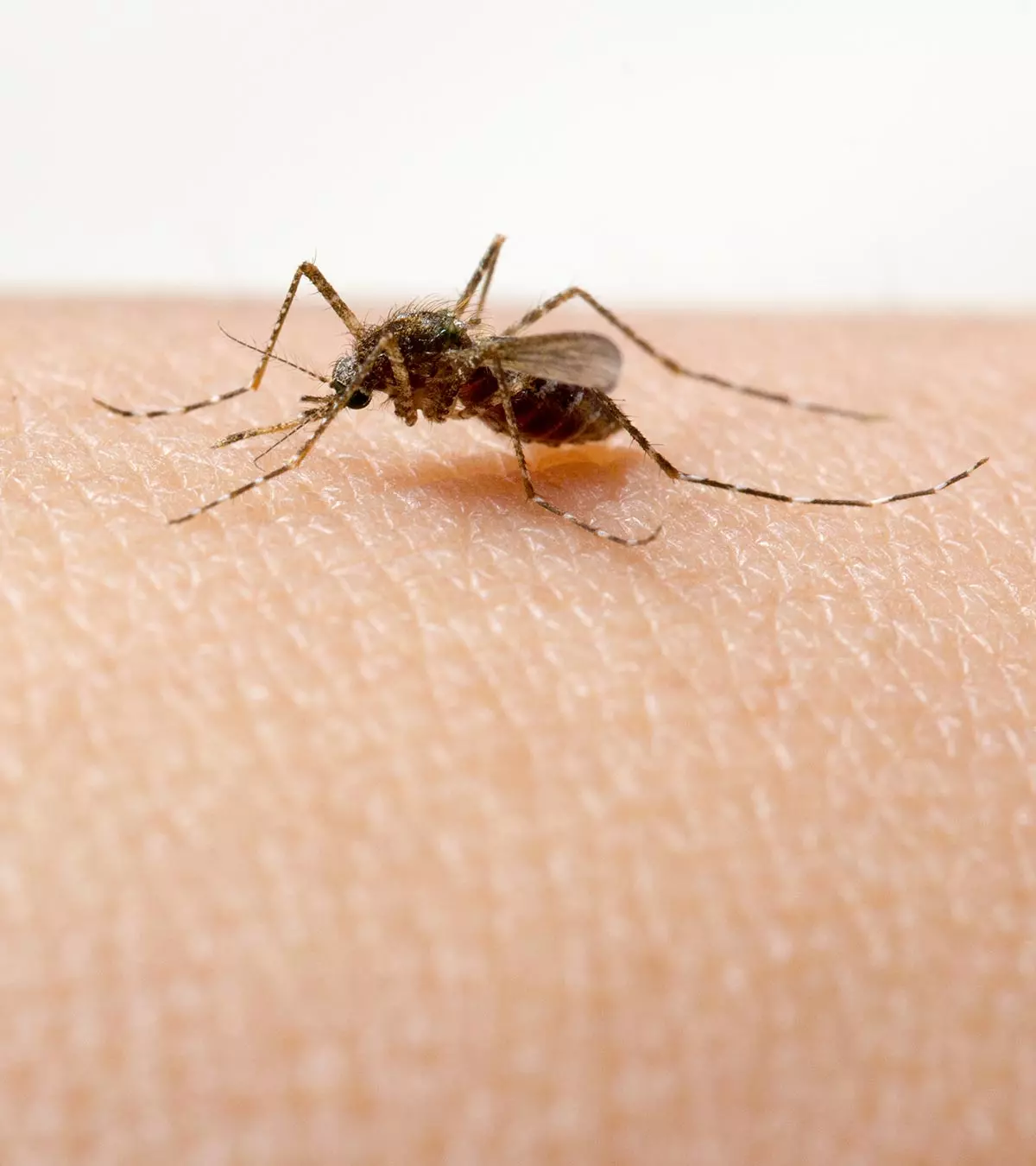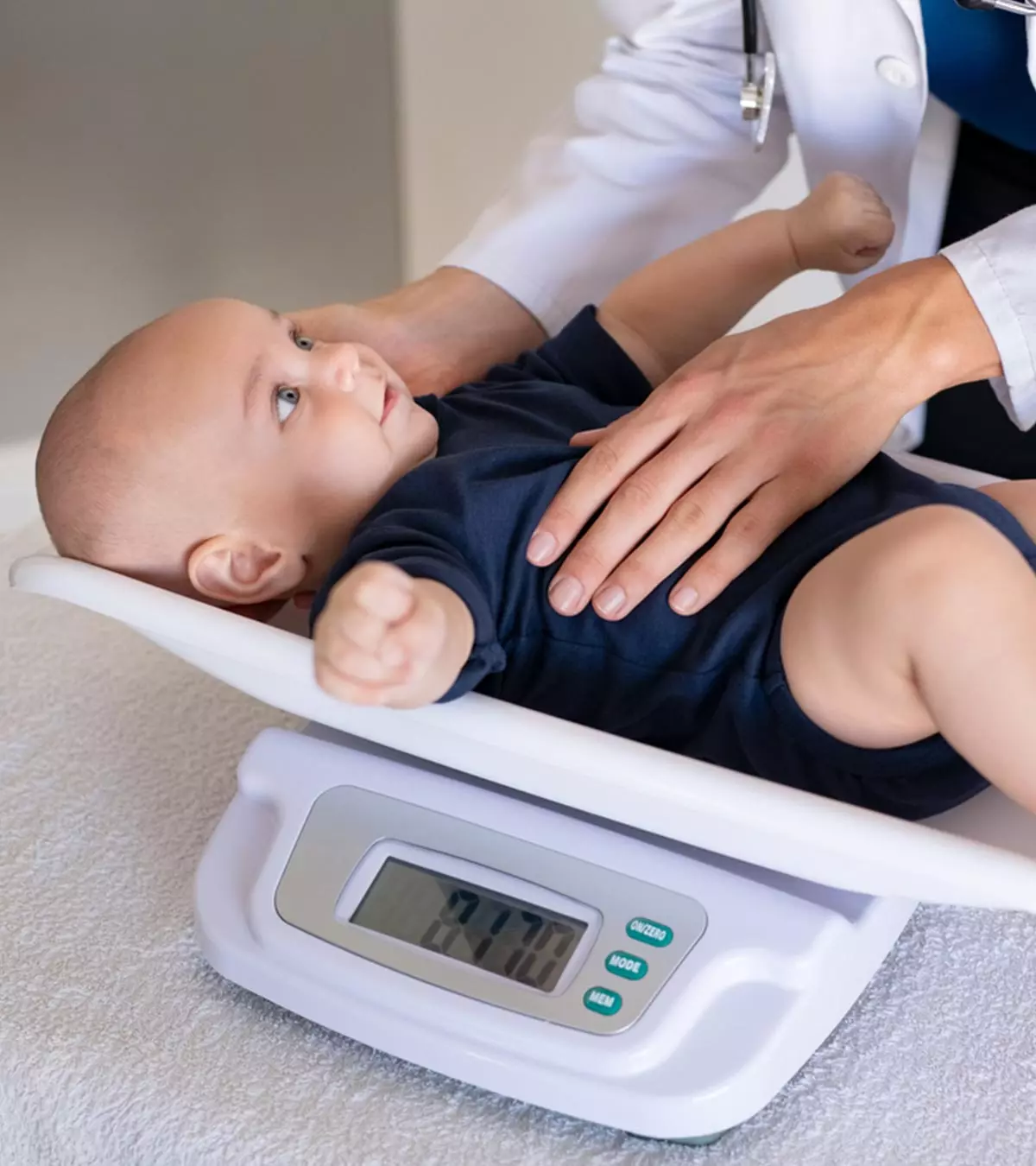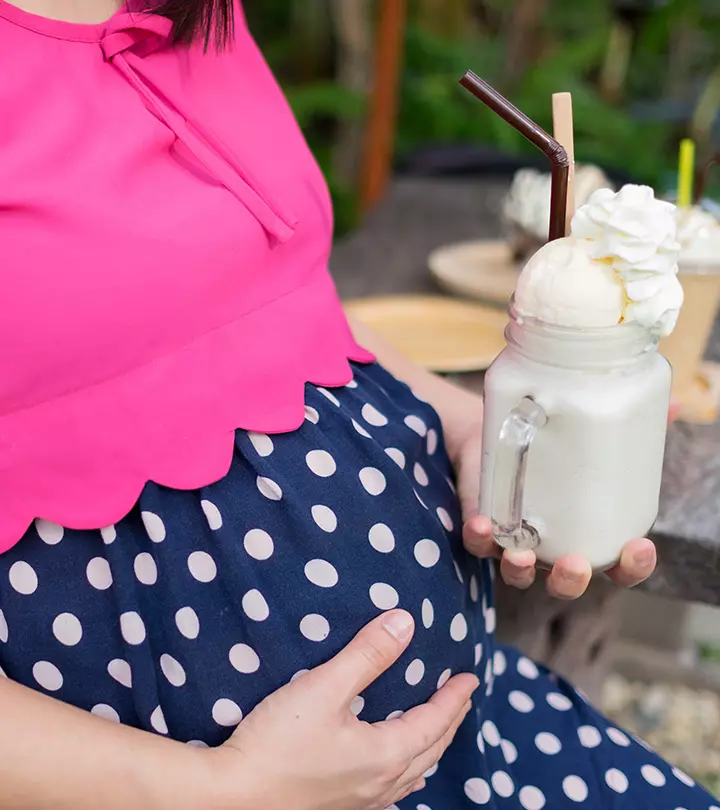
Image: Shutterstock

Most women have sweet cravings during pregnancy, and ice cream often tops the list. However, some may not support the idea of having delicious ice cream during pregnancy, while others may think it to be okay to indulge in one of these drool-worthy temptations. Therefore, you may need to keep a check on the amount consumed as pregnancy cravings can be baffling. Though ice creams are not known for their nutritional value, does it mean you cannot eat them at all when pregnant? Read this post to find out. Here we help you decide which ice creams and toppings to consider and what to avoid when you are expecting.
Key Pointers
- Ice cream contains high calories, high sugar, and fats but can be consumed occasionally to satiate pregnancy cravings.
- Ice cream can also be a source of carbohydrates and calcium, essential for the development of a growing fetus.
- Indulgence in ice creams may not always cause harm, but overconsumption may lead to health issues while pregnant.
- Pregnant women should be mindful of ingredients and possible allergens in the ice cream before consumption.
- Avoiding unknown flavors and ice cream made of unpasteurized milk is crucial to prevent any side effects.
Is It Safe To Eat Ice Cream During Pregnancy?
‘Can I eat ice cream during pregnancy?’ is a common question that keeps pondering the minds of many expectant mothers. However, the answer is yes; you can indulge in one occasionally. The basic ingredients of ice cream are dairy products (milk, cream), sugar, and eggs (sometimes), which are safe to eat during pregnancy. However, concerning eggs and milk during pregnancy, they should be pasteurizedi A process that uses heat to kill harmful bacteria in food while retaining the nutritional benefits. to eliminate the risks of bacterial poisoning (1).
Ice creams also have flavors that are usually not harmful to your pregnancy. But it is essential to know about the ingredients and flavors used to ascertain food safety, and to determine whether or not they are good for you. For example, if you are allergic to a fruit or nuts, avoid eating fruit-flavored ice cream and those that may contain nuts as toppings. To stay safe, avoid flavors or variants that you are not sure about.
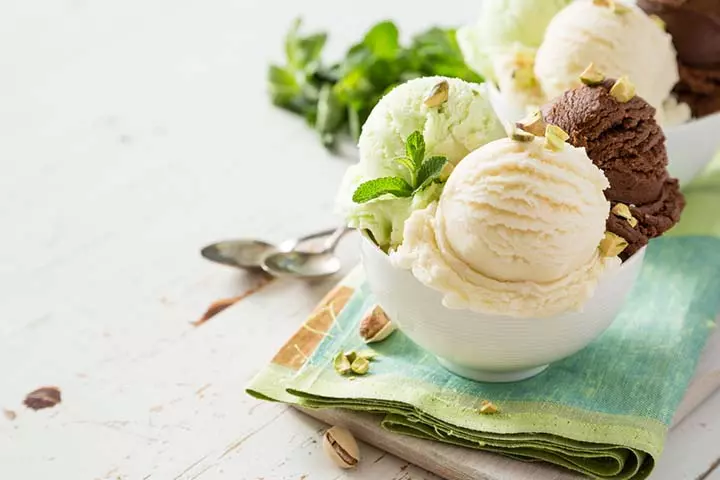
Moreover, eat ice cream sparingly, as a treat. Overindulgence in such foods can be a bad idea.
Nutritional Profile Of Ice Cream
Ice cream is one thing that most people eat for pleasure and not nutrition.
Nonetheless, it contains a few nutrients that could be helpful for maternal health.
According to the United States Department of Agriculture (USDA), 100 grams of ice cream provides you 200kcal, 2.8g protein, 24.29g carbohydrate, 22.86g sugars, 114mg calcium, 43mg sodium, 8 IU vitamin D, and 429 IU vitamin A (2).
However, ice cream also contains cholesterol and should be eaten in moderation.
Why Do You Crave Ice Cream When Pregnant?
During pregnancy, it’s not uncommon for women to crave something sweet, such as ice cream, due to hormonal changes (3). You might crave ice cream due to a lack of calcium in your body, or just because you are extremely fond of ice cream.
Make sure you do not have it in excess. Otherwise, it could affect your health.
In her blog, Asha Chohan shares her experience of savoring ice cream as a remedy for the metallic taste in her mouth during pregnancy. She expresses, “Hands up if you know what I mean by that ‘metallic’ taste on your tongue. Oh, the things we’d do to get rid of that revolting taste! My way to go was ice lollies! Any time I felt this taste in my mouth and my mouth started to feel really dry, I’d treat myself to an ice lolly. My husband filled our freezer with fruit pastel ice lollies as that’s all I wanted. They totally got rid of that awful metallic taste that sat on my tongue most days (i)!”
Possible Side Effects Of Ice Cream In Pregnancy
Here are a few side effects of overeating ice cream in pregnancy.
- If you have gestational diabetes, you should limit the consumption of ice cream as it is high in calories and carbohydrates. This helps control your blood sugar levels (4).

- Pregnant women are susceptible to infections such as toxoplasmosisiA infection caused by toxoplasma gondii through consumption of infected meats, causing pregnancy problems. and listeriosisiA disease caused by the bacteria Listeria monocytogenes through contaminated food, adversely affecting pregnancy , which can pose a serious threat to fetal health. Listeria, a type of bacteria that can cause food poisoning, has been linked to infections transmitted through contaminated ice cream. According to the Centers for Disease Control and Prevention report, in 2025, there were 28 cases of illness caused by listeriosis from consuming contaminated ice cream. Therefore, pregnant women must be cautious and avoid or limit the consumption of ice cream that may contain raw or unpasteurized ingredients, such as raw eggs or unpasteurized milk (5). You may avoid or limit eating ice cream when you are sensitive to cold. Although it is not harmful, you may get a fever or cold.
- You may avoid or limit eating ice cream when you are sensitive to cold. Although it is not harmful, you may get a fever or cold.
 Quick fact
Quick factIt is essential to know what is safe for your health and which ice cream can be safely consumed to avoid these infections and complications.
What Is The Best Ice Cream To Eat In Pregnancy?
If you are looking for safer ice cream options during pregnancy, you may consider non-fat frozen yogurt (6). Just make sure it is from well-known brands and is made with pasteurized ingredients that are safe to include in your pregnancy diet.
Also, pick up flavors that are suitable for your health. For instance, you may eat chocolate ice cream if you like chocolate. But have it occasionally and not too often. If you have any doubts, you may seek advice from your doctor, especially those who specialize in gynecology or prenatal care, regarding ice creams that are safe and not-so-safe for consumption.

Ice Creams You Should Not Eat In Pregnancy
Take note of these ice creams that you should avoid.
- Avoid soft serve ice cream and fried ice cream to prevent the risk of infections (7) (8).
- Even homemade ice creams are high-risk for pregnancy as they are made using raw eggs. It is better to get your ice cream from a branded store.
- If you are going for a cookie dough ice cream, check its ingredients. Some brands include raw eggs while some do not.
- Avoid ice creams with artificial flavors and colors since these could be potential allergens.
 Did you know?
Did you know?
Frequently Asked Questions
1. Can eating ice cream during pregnancy lead to high blood pressure?
Anecdotal evidence suggests that excessive consumption of saturated fats, such as those found in ice creams, increases blood pressure and the risk of heart disease (11). However, in most cases, high blood pressure is due to a combination of factors, and consumption of ice cream alone may not lead to it.
2. Does eating too much ice cream increase the risk of preterm labor?
There is no evidence that eating too much ice cream can lead to an increased risk of preterm labor.
3. Is it okay to eat ice cream as a late-night snack during pregnancy?
Many women crave ice cream during pregnancy. Since ice creams are generally made of milk, sugar, eggs, and flavors, eating them occasionally does not harm you or your baby. However, while choosing an ice cream, be sure to buy it from a good brand. Read the ingredients carefully to ensure you are not allergic to them. Avoid ice creams that have unpasteurized milk during pregnancy. Consume ice creams in moderation, as excess may cause cold and cough, listeriosis, or toxoplasmosis. If you experience any discomfort during pregnancy after consuming ice cream, seek advice from your obstetrician or another healthcare professional with expertise in obstetrics.
Infographic: Ice Creams You Should Eat And Avoid In Pregnancy
Having ice creams when pregnant can curb cravings for something sweet and keep you cool and refreshed. But not every ice cream is safe to eat as it may cause infections. So don’t worry; follow this infographic to know which ones to eat and avoid and indulge in your cravings without affecting your pregnancy.
Some thing wrong with infographic shortcode. please verify shortcode syntax
Illustration: Ice Cream When Pregnant: Safety Nutrition And Side Effects

Image: Stable Diffusion/MomJunction Design Team
Food cravings during pregnancy are common, but have you ever wondered why you crave ice? Discover the answer to this intriguing question in this informative video.
Personal Experience: Source
MomJunction articles include first-hand experiences to provide you with better insights through real-life narratives. Here are the sources of personal accounts referenced in this article.
i. My first trimester – Baby Cho Cho;https://ashachohanblog.wordpress.com/2017/10/19/my-first-trimester-baby-cho-cho/
References
1. Foods to avoid in pregnancy; NHS.uk
2. Ice creams, chocolate; Unites States Department of Agriculture
3. L. M. Belzer, J. C. Smulian, S. E. Su, and B. J. Tepper; Food cravings and intake of sweet foods in healthy pregnancy and mild gestational diabetes melitus. A prospective study.; Appetite (2010)
4. Diabetes During Pregnancy and Diabetes Survival Skills; The Ohio State University
5. The Dangers of Raw Milk: Unpasteurized Milk Can Pose a Serious Health Risk; USFDA
6. N. Dragon; Why Pregnancy Can Make You Have Weird Cravings; Intermountain Healthcare (2016)
7. Food & nutrition in pregnancy; The Royal Women’s Hospital;
8. Microbiological Quality Of Fried Ice Cream January – June 2016; Act Health Protection Service
9. Kyle S Burger and Eric Stice; Frequent ice cream consumption is associated with reduced striatal response to receipt of an ice cream–based milkshake; The American Journal of Clinical Nutrition
10. Carolyn Tam et al.; Food-borne illnesses during pregnancy Prevention and treatment; NCBI
11. High blood pressure and diet; National Library of Medicine
12. Kroeger; Reasons for late night eating and willingness to change: A qualitative study in pregnant black women; NCBI
13. The Eats and Don’t Eats of Pregnancy; Munson Healthcare, Michigan Health Endowment Fund
Community Experiences
Join the conversation and become a part of our nurturing community! Share your stories, experiences, and insights to connect with fellow parents.
Read full bio of Jyoti Benjamin
Read full bio of Swati Patwal
Read full bio of Rebecca Malachi
Read full bio of Aneesha Amonz








